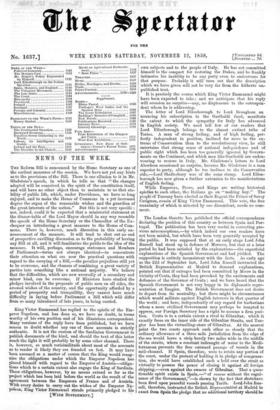King Victor Emmanuel has replied to the epistle of the
Em- peror Napoleon, and has done so, we have no doubt, in terms worthy of his own position and of his illustrious correspondent. Many versions of the reply have been published, but we have reason to doubt whether any one of these accounts is strictly authentic. It is not the custom of the Sardinian Government to publish documents of the kind, and should the text of this letter reach the light it will probably be by some other channel. There is, however, so much verisimilitude about most of the amounts as to render it likely they are founded on fact. It may have been assumed as a matter of course that the King would recog- nize the obligations under which the Emperor Napoleon has placed himself with regard to the Emperor of Austria—obliga- tions which to a certain extent also engage the King of Sardinia. These obligations, however, by no means extend so far as the project which has been laid before the world as the result of the agreement between the Emperors of France and of Austria. With every desire to carry out the wishes of the Emperor Na- poleon, King Victor Emmanuel stands primarily pledged to liis
1158 own subjects and to the people of Italy. He has not committed himself to the compact for restoring the Dukes, and he frankly intimates his inability to be any party even to endeavours for that purpose. Probably it will turn out that the description which we have given will not be very far from the hitherto un- published text.
It is precisely the course which King Victor Emmanuel might have been expected to take ; and we anticipate that his reply will occasion no surprise—nay, no displeasure to the correspon- dent whom he is addressing.
The letter of Lord Ellenborough to Lord Brougham an nouncing his subscription to the Garibaldi fund, manifests the extent to which the sympathy for Italy has advanced in English society. We need tell few of our readers that Lord Ellenborough belongs to the almost extinct tribe of Tories. A man of strong feeling, and of high feeling, per- fectly independent in position, inclined far more to the ex- treme of Conservatism than to the revolutionary view, he still entertains that strong sense of national independence and of public right which has been too generally ignored by Govern- ments on the Continent, and which men like Garibaldi are endea- vouring to restore in Italy. Mr. Gladstone's letters to Lord Aberdeen occasioned no surprise, because Mr. Gladstone is a man superior to party, although he too inclines to the Conservative side,—Lord Shaftesbury was of the same stamp. Lord Ellen- borough has now given a further extension to the manifestations of English feeling.
While Emperors, Peers, and Kings are writing historical epistles to each other, the Italians go on "making hay." The people of Tuscany have elected as their Regent the Prince of Savoy Carignan, cousin of King Victor Emmanuel. This vote, the free unanimity of which is attested by one dissentient, needs no com- ment.


































